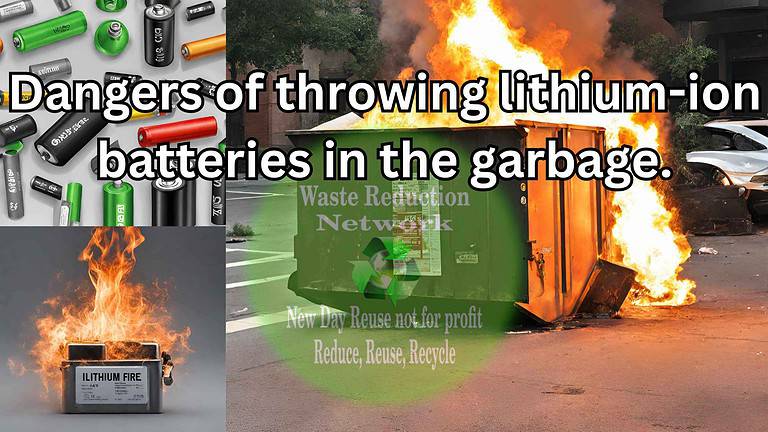
Dangers Of Throwing Lithium Ion Batteries In The Garbage. New Day Reuse inc 501(C)(3) Waste Reduction Network.
Throwing lithium-ion batteries in the garbage can pose several dangers and environmental risks. Here are some reasons why it’s important to dispose of lithium-ion batteries properly:
Fire Hazard:
- Lithium-ion batteries can pose a significant fire hazard if damaged or improperly handled. When thrown into the garbage, these batteries can be damaged, leading to short circuits and potentially causing fires.
Environmental Pollution:
- The chemicals present in lithium-ion batteries, including lithium, cobalt, nickel, and other metals, can be harmful to the environment if not disposed of properly. When batteries break open in a landfill, these substances can leach into the soil and water, contaminating ecosystems.
Resource Depletion:
- Lithium-ion batteries contain valuable and sometimes scarce metals such as cobalt and lithium. Proper recycling of these batteries allows for the recovery of these materials, reducing the need for new mining and helping to conserve natural resources.
Toxicity:
- The chemicals in lithium-ion batteries can be toxic to humans and animals if they enter the water or soil. Improper disposal can lead to the release of these toxins, posing a risk to both the environment and public health.
Waste Management Challenges:
- Lithium-ion batteries are considered hazardous waste, and their disposal is subject to regulations. When thrown in the regular garbage, they end up in landfills, complicating waste management processes and potentially putting sanitation workers at risk.
Explosive Risks:
- If lithium-ion batteries are damaged or punctured, there is a risk of gas or even explosion. Disposing of them in the garbage without proper precautions increases the likelihood of such incidents.
Regulatory Compliance:
- Many regions have regulations regarding the proper disposal of hazardous waste, including lithium-ion batteries. Improper disposal may lead to legal consequences.
To minimize these risks, it’s important to recycle lithium-ion batteries through designated recycling programs or collection facilities. Many electronics retailers and recycling centers accept old batteries for proper disposal and recycling. Some municipalities also have specific drop-off locations for hazardous waste, including batteries. Always check and follow local regulations for battery disposal to ensure that you are acting in accordance with the law and protecting the environment.
Proper ways to dispose of Lithium-Ion Batteries
Proper disposal of lithium-ion batteries is essential to prevent environmental pollution, ensure safety, and promote resource recovery. Here are some recommended ways to dispose of lithium-ion batteries:
Recycling Programs:
- Many regions have dedicated recycling programs for batteries, including lithium-ion batteries. Check with your local waste management or recycling facility to find out where you can drop off used batteries for recycling.
Retailer Take-Back Programs:
- Some electronics retailers, such as electronics stores or mobile phone providers, offer take-back programs. They may provide collection bins in their stores where you can drop off used batteries for proper disposal and recycling.
Municipal Collection Events:
- Some municipalities organize hazardous waste collection events where residents can drop off items like batteries, paints, and other potentially harmful materials. Check with your local government for information on upcoming collection events.
Specialized Recycling Facilities:
- Look for specialized recycling facilities that handle electronic waste and batteries. These facilities are equipped to handle the proper disposal and recycling of lithium-ion batteries.
Mail-In Recycling Programs:
- Some organizations and recycling companies offer mail-in programs for battery recycling. You can request a mail-in kit, place your used batteries in the provided packaging, and send them to the recycling facility.
Call2Recycle:
- In some regions, the Call2Recycle program provides drop-off locations for rechargeable batteries, including lithium-ion batteries. You can use their website to find a nearby collection site.
Battery Recycling Boxes:
- Some communities provide battery recycling boxes in public places, such as libraries, community centers, or businesses. Check if there are any convenient drop-off locations for battery recycling in your area.
Local Household Hazardous Waste Collection Centers:
- Many communities have household hazardous waste collection centers where you can drop off items like batteries, paints, and chemicals. Check with your local waste management or environmental services department for information.
When preparing lithium-ion batteries for disposal:
Cover Terminals:
- Tape over the battery terminals to prevent short circuits and reduce the risk of fire.
Store Temporarily:
- If you can’t dispose of the batteries immediately, store them in a cool, dry place away from flammable materials.
Always follow local regulations and guidelines for battery disposal to ensure compliance with environmental and safety standards. Proper disposal of lithium-ion batteries contributes to environmental sustainability by promoting resource recovery and minimizing the potential for harm to the environment and human health.
Information for this post was gathered from various sources across the internet, And AI requests.

